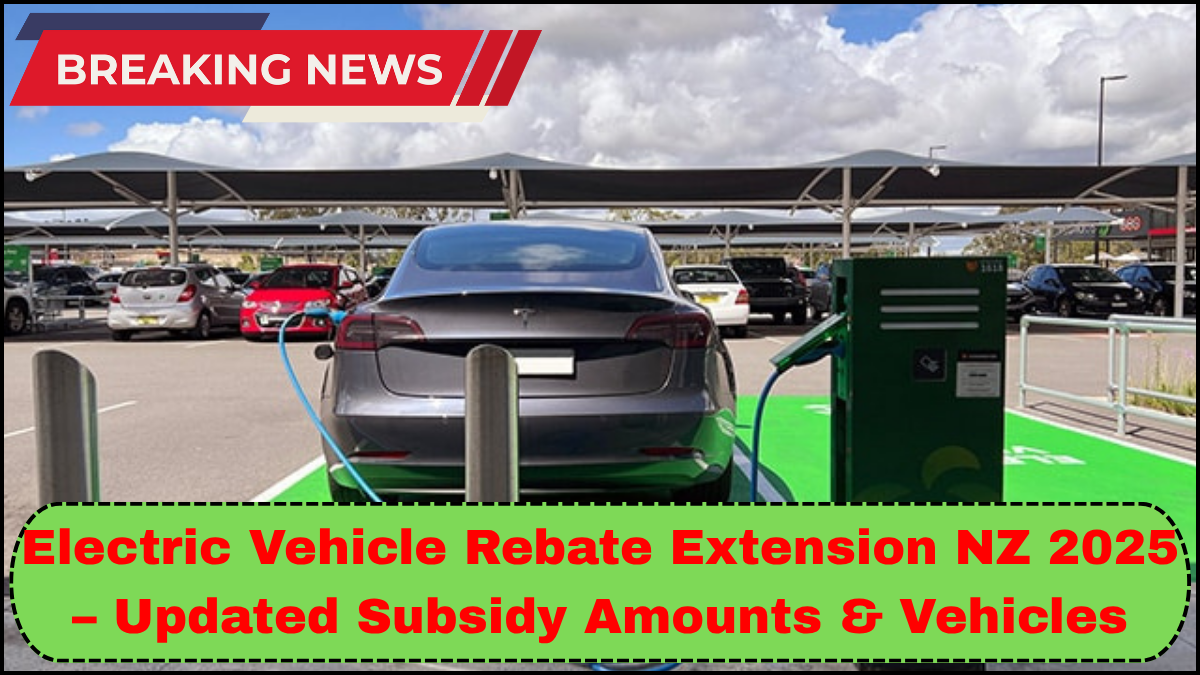The electric vehicle rebate extension NZ 2025 brings renewed incentives for Kiwis looking to make the switch to cleaner transportation. With climate targets looming and consumer demand for low-emission options on the rise, the New Zealand Government has officially extended and revised its EV subsidy update, offering new rebate figures and refining the list of eligible vehicles.
Here’s everything you need to know about the updated government rebate scheme, including new subsidy amounts, qualifying criteria, and what this means for consumers and the automotive market in 2025.

Why the EV Rebate Extension Matters in 2025
New Zealand has committed to reaching net-zero carbon emissions by 2050. The transport sector, which accounts for nearly 20% of the country’s emissions, is a major target for reform. To accelerate the adoption of electric vehicles (EVs), the government introduced its Clean Car Discount initiative in previous years.
The electric vehicle rebate extension NZ 2025 builds upon this framework, addressing both environmental goals and consumer affordability. By continuing and enhancing the government rebate scheme, the extension aims to boost uptake among private buyers and fleets while promoting a shift away from fossil-fueled vehicles.
Updated EV Subsidy Amounts for 2025
As of 2025, the updated rebate amounts reflect the government’s increased investment in sustainable mobility. Here are the revised figures under the extended scheme:
-
New Electric Vehicles (EVs): Up to $9,000 (previously $8,625)
-
Used Imported EVs: Up to $4,500 (previously $3,450)
-
Plug-in Hybrid Electric Vehicles (PHEVs): Rebates vary between $3,000–$4,000 depending on the model and emissions rating
-
Low-Emission Vehicles (Non-EV): Partial subsidies of up to $2,500, focused on ultra-efficient hybrids
These updated figures reflect a more aggressive approach, aiming to counterbalance the rising costs of new EV models and inflationary pressures in the auto market.
Eligible Vehicles Under the 2025 Rebate Scheme
Eligibility criteria have also been tightened to ensure the EV subsidy update is directed at vehicles that deliver significant emissions reductions. To qualify for the full rebate:
-
The vehicle must be brand new or a recently imported used EV or PHEV
-
The purchase price must be below $80,000 including GST and on-road costs
-
The vehicle must have a 3-star or higher safety rating
-
The emissions output must meet or fall below the defined CO2 threshold (approx. 146g/km for 2025)
The government has published an online portal where prospective buyers can verify the eligibility of specific makes and models before purchase. This transparency ensures informed decisions and prevents disputes around rebate claims.
Fleet Buyers and Business Incentives
In a major shift, the 2025 rebate extension also introduces tiered benefits for business and fleet buyers, who represent a significant portion of vehicle sales in New Zealand. Eligible companies can now access:
-
Bulk rebate applications for fleet purchases
-
Tax deductions on top of EV rebates
-
Priority access to government-sponsored EV charging infrastructure grants
These measures aim to electrify commercial fleets and delivery services, reducing emissions in sectors where heavy vehicle use is common.
What About the Fees for High-Emissions Vehicles?
The electric vehicle rebate extension NZ 2025 is still funded in part by fees on high-emission vehicles—commonly referred to as the “feebate” system. Buyers of petrol and diesel vehicles with high CO2 output (above 192g/km) will continue to face additional costs, often exceeding $5,000, depending on the model.
This cross-subsidization helps maintain fiscal balance in the rebate programme and encourages consumers to shift towards cleaner alternatives.
Impact on the EV Market
With more generous rebates and clearer guidelines, the 2025 extension is expected to drive EV adoption past 40% of new vehicle registrations. Popular models like the Tesla Model 3, BYD Atto 3, MG ZS EV, and Hyundai Kona Electric remain high in demand, especially now that several models fall within the revised pricing cap.
Used EV imports from Japan and Europe are also set to rise, offering more budget-friendly options for first-time buyers.
FAQs – Electric Vehicle Rebate Extension NZ 2025
Q1: When does the 2025 EV rebate extension take effect?
The updated rebate scheme comes into force on 1 July 2025, replacing the previous version of the Clean Car Discount.
Q2: Can I apply for a rebate after purchasing my EV?
Yes, but you must submit your application within 90 days of registration to be eligible.
Q3: Are all hybrids eligible for rebates?
No. Only plug-in hybrids (PHEVs) and ultra-low emission hybrids that meet CO2 thresholds and safety ratings qualify for rebates.
Q4: What happens if I buy a car over $80,000?
Vehicles priced above the cap are excluded from the subsidy, regardless of their emissions profile.
Q5: Can businesses claim rebates on leased vehicles?
Yes, businesses can claim rebates on leased EVs as long as the lease meets the qualifying criteria set by the government.
click here to learn more